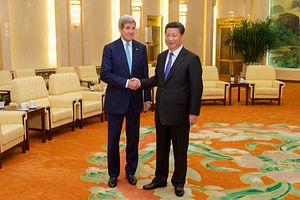U.S. Secretary of State John Kerry left for Beijing and Seoul on Saturday, only a few days after a Wall Street Journal report, citing anonymous U.S. military officials, suggested Washington might be looking to step up its role in the South China Sea (my colleague Prashanth has more on what a more robust U.S. presence in that region might look like). The U.S. State Department insisted that Kerry’s visit was to be focused on “establishing the groundwork both for productive outcomes at the Strategic and Economic Dialogue … [and] for the planned state visit by President Xi Jinping in the fall.” But given the timing of Kerry’s trip, he seemed destined for an unpleasant reception in Beijing.
On Wednesday, for example, China’s ambassador to the U.S., Cui Tiankai, blasted Washington’s role in the South China Sea disputes in an interview with Chinese media outlets. He accused the United States of adopting double standards toward the disputes by criticizing China and overlooking similar construction and reclamation activities on disputed islands by other claimants. Cui also warned against a proposal that would see the United States send naval vessels and aircraft within 12 nautical miles of certain Chinese-claimed features.
Meanwhile, a senior State Department official told the press before Kerry’s visit that “he will leave his Chinese interlocutors in absolutely no doubt that the United States remains committed to maintain freedom of navigation and to exercise our legitimate rights as pertain to overflight and movement on the high seas.” The official added that Kerry would also emphasize that China’s land reclamation is not going to strengthen its territorial claims.
A Xinhua piece, published the day Kerry arrived in Beijing, urged him not to “be the dupe of a vicious trap” by arguing with China over the South China Sea. The spate of media reports suggesting this would be Kerry’s focus “smacks of a plot to force Kerry to take on an issue that should never become a concern in China-U.S. ties,” the piece said. Ironically, for a piece that suggests Kerry’s visit should not focus on the South China Sea, the article itself mentions little else.
During official talks, however, Kerry and Chinese officials did try to focus on the positive. Chinese Foreign Minister Wang Yi said that the “new model of [major country] relationship has made much headway” since the 2013 Sunnylands summit between Presidents Xi Jinping and Barack Obama. Kerry emphasized U.S.-China cooperation on global and regional issues, from the Iran talks and climate change to North Korea’s nuclear program.
But all the forced positivity of press conference soundbites can’t change an underlying reality – China is more or less satisfied with the status quo while in the United States, more and more voices are calling for a sea change in Washington’s China policy. While there are of course changes Beijing would like to see occur in its relationship with Washington (thus the call for “new type major power relations”), Chinese media and official alike emphasize that the U.S.-China relationship as it currently stands is “healthy” (according to Xinhua) and “stable” (Xi Jinping). Fewer and fewer U.S. thinkers agree. From analysts to policymakers, there’s a growing consensus that the United States needs to change the way it approaches China, lest it lose ground to Beijing and see its national interests in the Asia-Pacific eroded.
The South China Sea issue is a case in point. U.S. officials have apparently decided that a new strategy is necessary – the only question is what that strategy will look like. The U.S. approach to cyber issues involving China has also changed drastically in the past two years, with the administration becoming much more vocal about airing its grievances and seeking to take concrete action to stem cyber espionage against U.S. commercial firms.
For Washington, these changes in strategy were necessary to secure U.S. interests. For China, they were provocative threats to an essentially “stable” relationship. That difference in perception is the root cause behind the current U.S.-China tensions — and it’s not going to go away anytime soon as policymakers in Washington consider other options for tweaking policy.

































